By Paul Adams
I’ve been involved in the performing arts almost all my life—whether I was playing a rock-and-roll shepherd in my primary school’s Nativity production, or in my current role as the Learning and Engagement Manager for the Singapore Repertory Theatre (SRT).
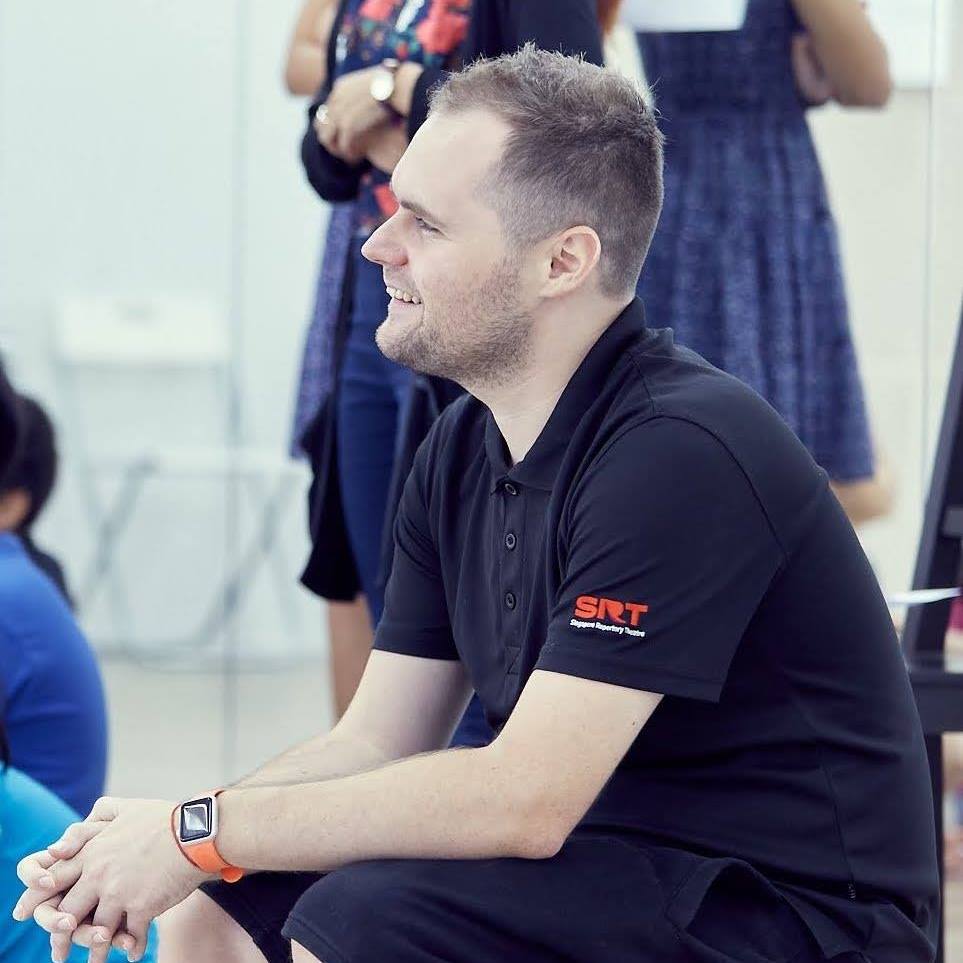
Photo courtesy of Paul Adams
I grew up in the UK in a town called Oldham and come from a working-class background. Although I attended some extra-curricular classes, drama lessons at school were what sparked and fuelled my desire for the subject. Offering me much more than acting skills, they also gave me the confidence to communicate and connect with people more easily—to be heard as well as to listen and understand others. Through drama, I learned to take bold risks and express myself without judgement, as well as to collaborate closely with my peers (in no other activity or sport have I experienced a stronger team ethos). Along the way, encouraged by inspiring teachers who nurtured the talent they saw in me, I began to consider the possibility of a performing arts career. Today, many years on, having experienced first-hand the impact of the arts, it helps put into context why I strive to reach more children, youths and adults through my work at SRT.
Classrooms as Rehearsal Rooms
It is incredibly important to give the arts a place in schools, not only as a learning subject, but also as a way to nurture a vibrant school culture. Most people already recognise that creative thinking and innovation are vital for career success—at work, we need to adapt quickly, react to digital developments and forge strong partnerships. Similarly, the creative arts can equip students with such essential skills. Drama classes are particularly effective because they start from a place of “no wrong answers”. Through drama, we learn to express our opinions and empathise with others, understand how to tell a great story, and build our verbal and non-verbal communication skills.

Paul with participants of Stage Camp; image courtesy of Paul Adams
One of my favourite books is Sir Ken Robinson’s The Element: How Finding Your Passion Changes Everything . I truly admire Robinson’s passion to transform education through creativity—to this end, he has worked with governments and global corporations, and led international projects on creative and cultural education.
“The fact is that given the challenges we face, education doesn't need to be reformed —it needs to be transformed. The key to this transformation is not to standardize education, but to personalize it, to build achievement on discovering the individual talents of each child, to put students in an environment where they want to learn and where they can naturally discover their true passions.” —Ken Robinson, New York Times bestselling author of The Element: How Finding Your Passion Changes Everything
In my work at SRT, I have been developing education programmes to support this idea of transforming the way we see education. We have provided professional development for teachers, delivering a range of workshops for students that focus on performance outcomes or that use drama as a vehicle to achieve cross-curricular aims and objectives. In May 2019, we launched Singapore Wolf Trap, a five-year partnership managed by SRT with Wolf Trap Institute for Early Learning Through the Arts. This partnership is a strategic development to support growth and embed arts practice in early-years settings for the benefit of teachers professional development and to foster a holistic approach to learning through art strategies. Additionally, we are working with local specialists in the science field to further develop Science, Technology, Engineering, Arts and Math (STEAM) subjects. We’ve put the “A” in STEM with arts activities that enhance core skill development and that make learning memorable through interactive and theatrical experiences. Personally, I also advocate for the idea of “drama for drama’s sake”. Creative industries are developing rapidly, and there are job opportunities both in and out of the spotlight. As such, training to be an actor is a valid career choice; like any profession, one must strive to do their job well and enjoy what they do, in order to be successful.
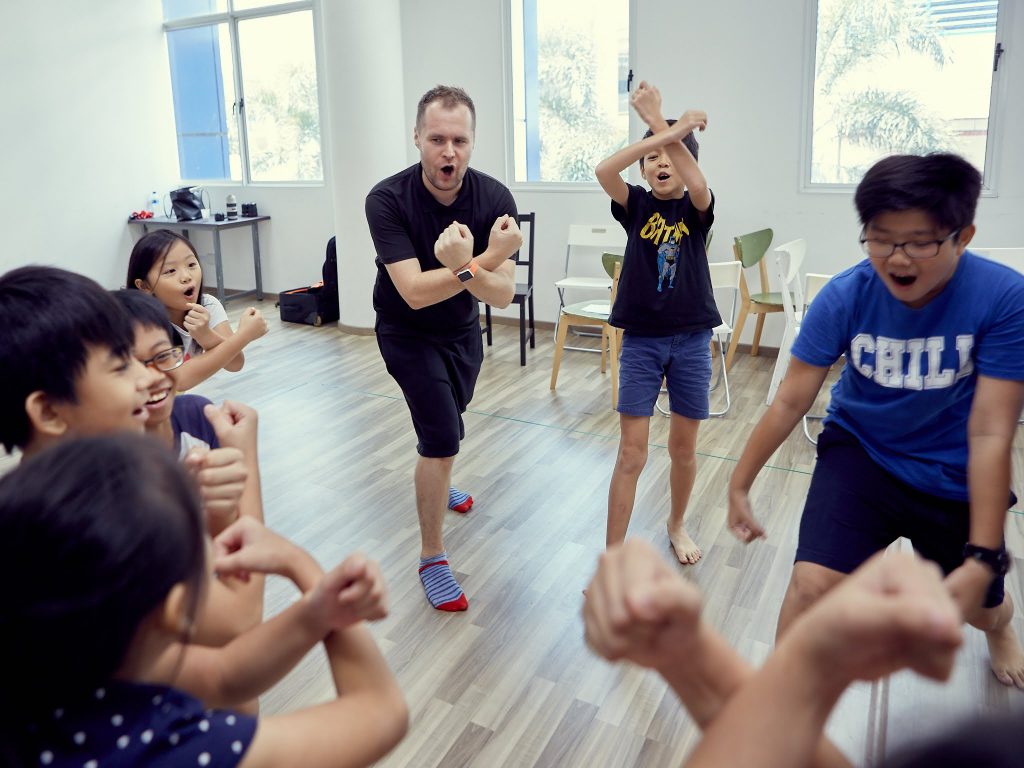
Paul with participants of Stage Camp; image courtesy of Paul Adams
In a similar vein, why then, shouldn’t we see our schools as theatres and our classrooms as the rehearsal rooms for life? Push back the tables and chairs, get the students on their feet. Allow them to explore literature together by stepping into character and discovering the wonders of the world through imagining themselves there. For instance, the kids could attempt to solve a Mathematics equation by visualising the problem and embedding it in a real-life, relatable experience. At the end of the day, students need to be heard, so we have to allow them to step “onstage” and be directors of their own learning.
All the World’s a Stage
Way beyond the formal arena of arts education, is the world of participatory and community arts practices. In “applied theatre”, performances can be held in non-traditional theatre spaces, featuring people who may or may not be actors and may not be seeking the arts in any form. Some of my most memorable projects include making theatre with adults experiencing homelessness in Lancaster (UK), and supporting female prisoners to write stories during a pilot programme at Changi Prison. My common goal, in these and similar programmes, is to give the time and space for people to meet, talk and discover, and then present their life experiences through the lens of drama. For me, that is the most challenging but also most impactful kind of work.

Photo by John T via Unsplash
I have also partnered with many young people who came to discover a passion for theatre. Participating in the arts raised their confidence levels considerably and they went on to apply for further education courses and entered employment in the industry. Their success was not just because of their drama skills, but because drama classes had supported their development into well-rounded individuals. In other instances, I’ve seen adults struggling with substance abuse rewrite classic literature to reflect their own situation, and go on to perform in front of a live audience. That is no mean feat. Imagine stepping into a rehearsal space for the first time, thinking, “I’m not sure about this”, and only months later having to perform your first short play, reimagined by your experiences and ideas, and feeling the impact of viewing yourself and situation from another angle! This is what I love about theatre production. I enjoy watching an idea transform into a story to be told on stage, with actors, lights, costumes, sets, props and music all coming together to transport us somewhere else. I also appreciate the many other elements involved in staging a show, from finance and marketing, to technical stage and design. Because what this means is that there are not just opportunities in the “performance” areas, but multiple learning and development opportunities across diverse skill sets, too. By splitting open the process of theatre-making, you create moments that allow participants to develop in many areas of their life and, in turn, open up the eyes, hearts and minds of their communities. Art is fundamentally a very “human” experience, requiring an interaction and often anchored in elements of real life. Reflecting someone’s personal experiences in drama helps us find new ways to understand and relate to one another better.
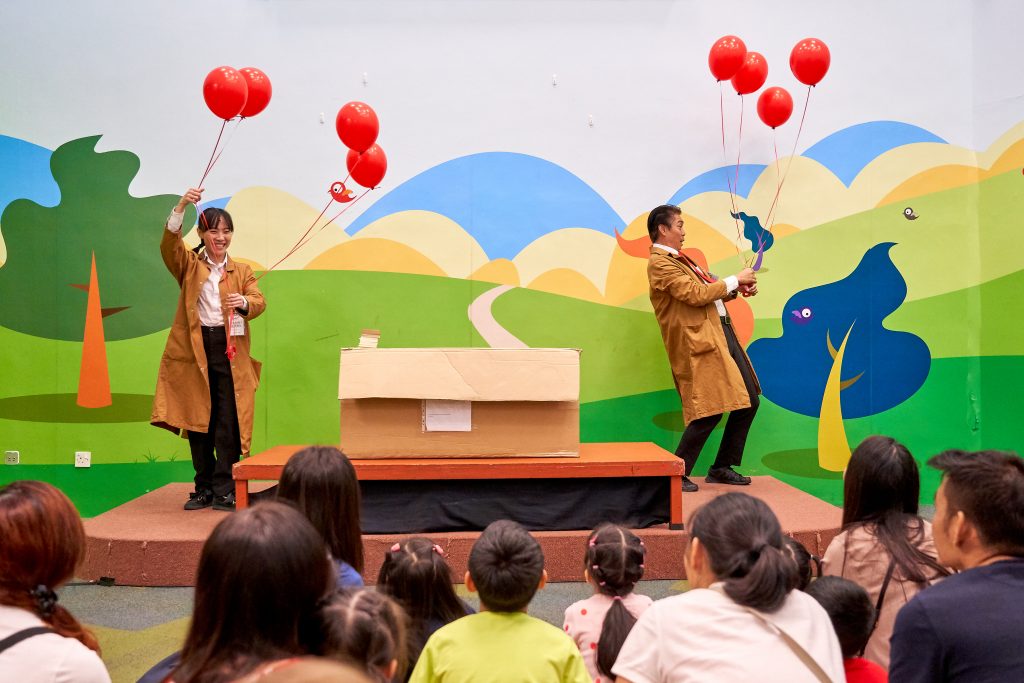
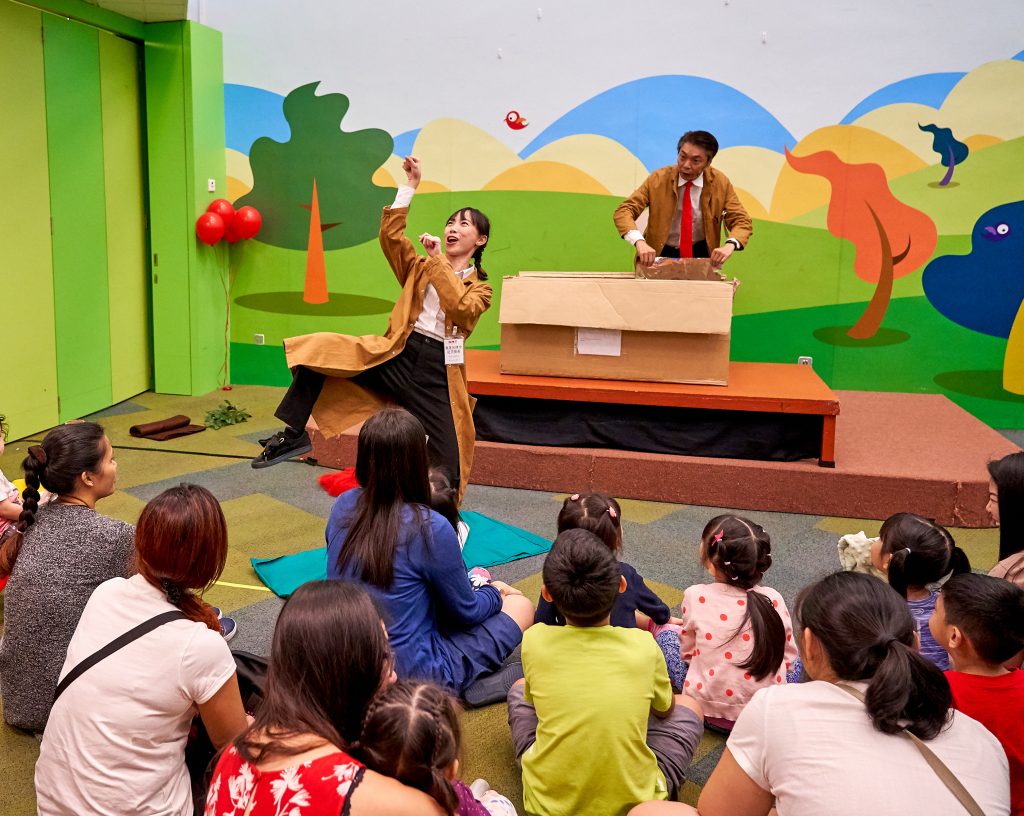
Upstairs in the Sky, a play held in various community libraries; images courtesy of Paul Adams
More recently, the SRT has offered free public access to theatre by taking our stage to community libraries. The play, Upstairs in the Sky , performed in English and Mandarin, both entertained and delivered a social message about “play” and “grief”. We also produced, in partnership with Shan You Counselling Centre, The Silence Bubble , a pop-up theatre experience at the HDB Hub to highlight the need to destigmatise mental illness. At this event, a large, transparent inflatable bubble was placed in the mall area, housing an actor portraying someone living with a serious mental health condition. This event allowed curious onlookers to catch a realistic glimpse into the solitude and struggles of those with mental illness.
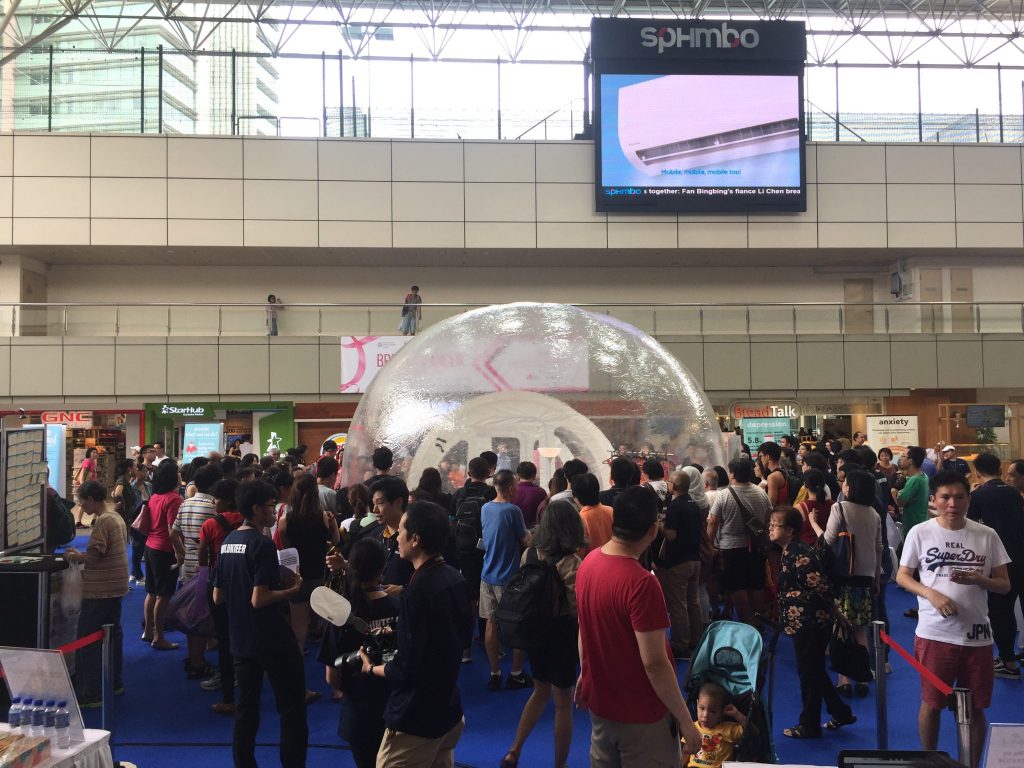
The Silence Bubble; image courtesy of Paul Adams
The SRT is pleased to be restaging this event in 2019, and there are plans for new stories to be displayed in the “bubble” in 2020. SRT will also launch Pick a Hero: Defeat the Bullies across 2019–20. A peer-to-peer youth theatre programme with local schools, Pick a Hero will encourage young people to talk, create and build communities that support one another against the signs, challenges and effects of bullying—whether emotional, physical or online. Through these community and participatory arts programmes, we are taking the “stage” to our libraries, community centres and homes. We are also offering many ways to meet people where they are, as well as giving them the choice to engage as they wish to.
Access at SRT
Access at SRT aims to make arts programming and venues more inclusive and available to all, including individuals with disabilities. Is there a ramp to the theatre? Do audio descriptions accompany an art exhibition? Are promotional videos captioned? These questions, and more, are considered, as part of the goal to promote the social model of disability and actively make adjustments to enable, rather than disable. In this “access” model, the term “disabled” does not necessarily describe an individual. Instead, it refers to how society “disables” somebody by the way it operates. Think about it: Why make steps when ramps can be used by everyone? Why build toilets that are inaccessible for some? In marketing and promotions, why isn’t written information available in more formats? Why should plays be enjoyed only by hearing people when captions can be integrated to support everyone’s enjoyment?
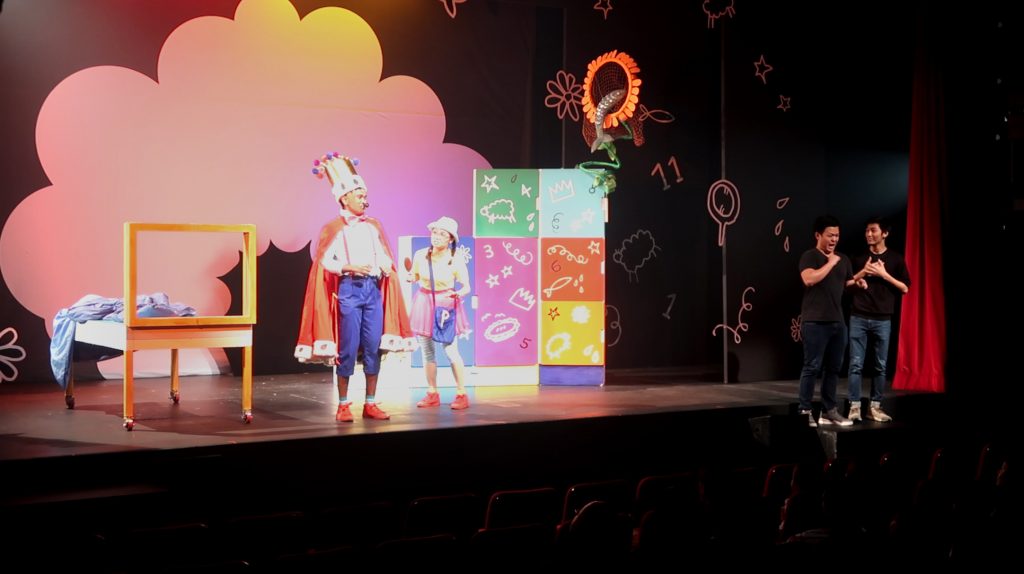
Nursery Crimes: An SgSL (Singapore Sign Language Interpreted Performance Nursery Crime) performance at KC Arts Centre—Home of SRT
In the last 12 months, SRT, along with many industry friends, have launched the Access Arts Hub, a collective of people and organisations with a shared vision to improve access to arts in Singapore. It is an exciting initiative that raises awareness of the social model—if it is the society that disables, then it is also the society’s responsibility to take active steps towards change. Additionally, SRT trained nine local audio describers, over an intensive six-day programme, supporting the wider industry to now include Audio Description Services for vision-impaired patrons who wish to attend the theatre. SRT kicked off 2019 with the launch of its first two audio-described performances for Gretel and Hansel and The Truth at KC Arts Centre, and there are many more planned that will open its stage for all.
Access Development Programme at SRT is made possible by the David Marshall Endowment, managed by Temasek Foundation.
The arts is for all to explore and enjoy. It gives one the freedom to discover, and to better understand the world and others around them. It is a space free of judgement, and where empathy and compassion abound. Through this commentary, I hope to have made a convincing case for why we should place the perfoming arts at the centre of our schools and communities—as a vehicle to share stories as well as learn.
Banner photo by Wei-Cheng Wu via Unsplash
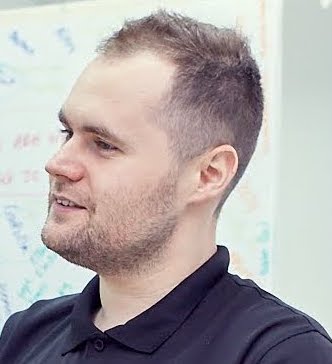 |
Paul Adams is the Learning and Engagement Manager at the Singapore Repertory Theatre. Originally from Manchester, UK, he joined SRT after a decade in the theatre industry working for leading charities and commercial theatre companies. Paul has a Diploma in Musical Theatre and a Bachelor of Arts Degree in Performance from the University of Huddersfield. His focus is on facilitating and managing arts education programmes and participation opportunities across formal education, community outreach and venue-based programmes. He is part of the team driving the Access Arts Hub, a consortium of organisations and individuals championing better access to the arts for persons with disabilities. Paul can be reached at paul@srt.com.sg |








Comments